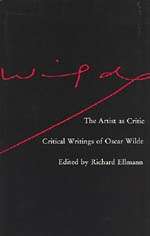The Artist as Critic

Editorial University Of Chicago Press
Fecha de edición mayo 1998
Idioma inglés
EAN 9780226897646
474 páginas
Libro
encuadernado en tapa blanda
Resumen del libro
Although known primarily as the irreverent but dazzlingly witty playwright who penned The Importance of Being Earnest, Oscar Wilde was also an able and farsighted critic. He was an early advocate of criticism as an independent branch of literature and stressed its vital role in the creative process. Scholars continue to debate many of Wilde's critical positions.
Included in Richard Ellmann's impressive collection of Wilde's criticism, The Artist as Critic, is a wide selection of Wilde's book reviews as well as such famous longer works as "The Portrait of Mr. W.H.," "The Soul Man under Socialism," and the four essays which make up Intentions. The Artist as Critic will satisfy any Wilde fan's yearning for an essential reading of his critical work.
Biografía del autor
Novelista, poeta, crítico literario y autor teatral de origen irlandés, gran exponente del esteticismo, Oscar Wilde conoció el éxito desde sus comienzos gracias al ingenio punzante y epigramático que derrochó en sus obras, dedicadas casi siempre a fustigar a sus contemporáneos. Defensor del arte por el arte, sus relatos repletos de diálogos vivos y cargados de ironía provocaron feroces críticas de los sectores conservadores, que se acentuaron cuando Wilde fue acusado y condenado por su homosexualidad, lo que originó el declive de su carrera literaria y de su vida personal. Entre sus obras destacan las cuatro comedias teatrales El abanico de lady Windermere (1892), Una mujer sin importancia (1893), Un marido ideal (1895) y La importancia de llamarse Ernesto (1895), El fantasma de Canterville o El retrato de Dorian Gray, su única novela.








